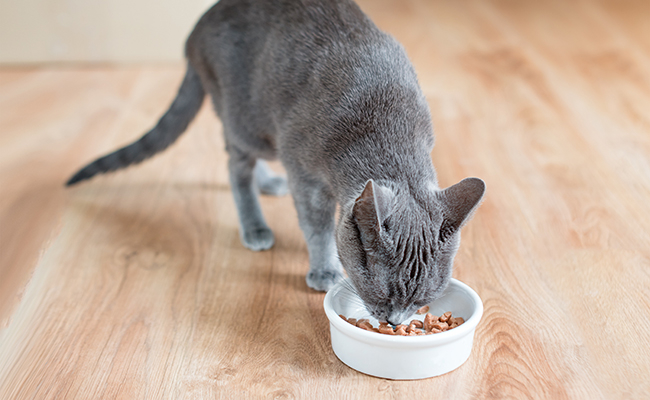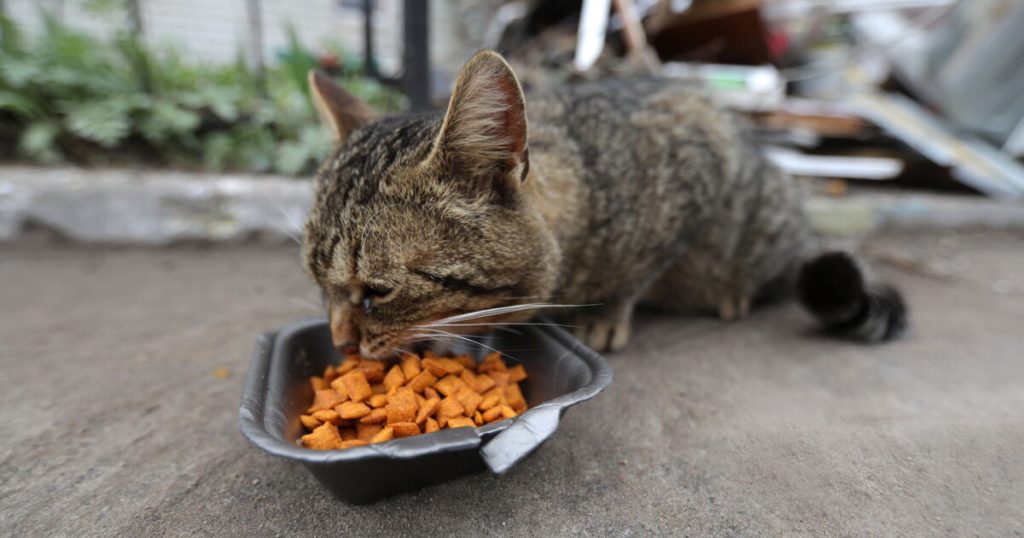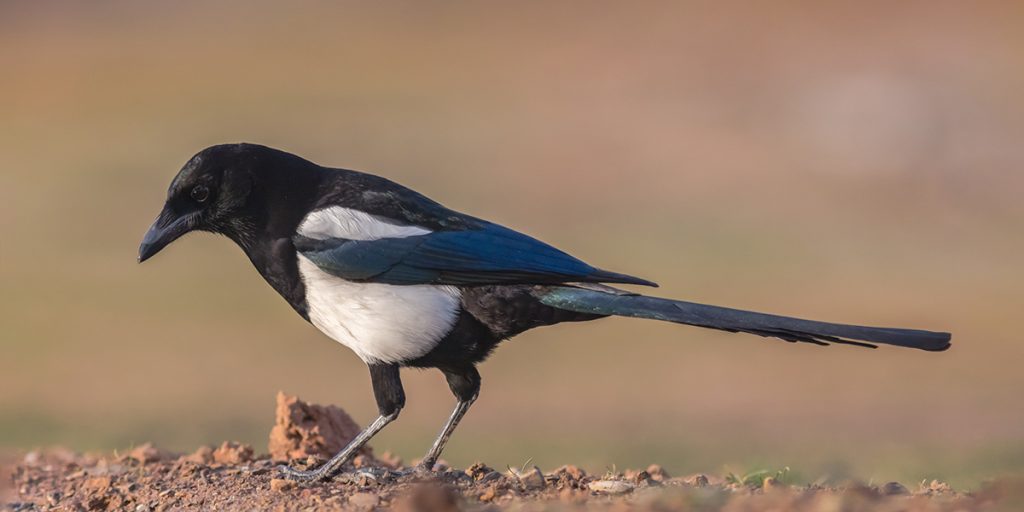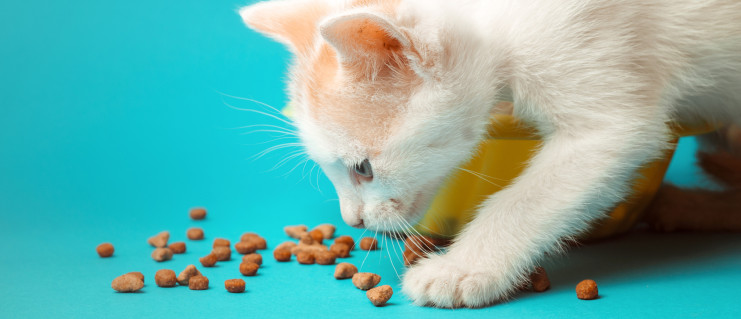
Due to the small size of its stomach, the cat needs to eat several times a day, but some, even if they respect this rhythm, rush to eat. Eternal nibblers, our little felines ration themselves throughout the day rather than wolfing down their meal all at once. If, however, your cat, usually serene in front of its bowl, turns into a gluttonous ogre, there is undoubtedly a problem. What could cause your cat to eat too quickly? How to help him regulate himself? This is what we will discover in this article.
What causes the cat to gobble up its meal?
Have you barely called kitty for a meal when the bowl is already empty? Whether it is a bad habit acquired from his first steps in your home or whether he has only been eating his bowl for a few days, the too rapid absorption of portions of his daily diet can cause numerous inconveniences for the health of your cat:
- Vomiting;
- Bloating;
- Malabsorption of nutrients;
- Inability to feel full;
- Weight gain.
In order to help your mistigri regain a healthy appetite and no longer act like a glutton, you must first determine the cause of this pantagruelian voracity.
The quality of nutrition
For the owner of the little feline, it is not always easy to choose the most suitable food. Indeed, in addition to the choice between wet or dry food, dual nutrition or household ration, the owner must also ensure that the food chosen meets the energy needs of his miniature predator. A strict carnivore, pâtés, croquettes or small homemade meals must meet their protein needs above all. The excessively high fat content of certain prepared foods is not suitable for our felines. Not satisfying enough, they push the cat to gorge itself to satisfy its hunger. To perfectly meet your cat's nutritional needs, it is best to analyze the labels of the kibbles and foods you offer them.
The stress
Stress is one of the elements that will affect the way your cat eats its bowl. Indeed, some cats are more sensitive than others to the small and big changes that can occur in our lives. A move, the departure of one of our children, the arrival of a new four-legged companion can distress your mistigri. Some cats seek refuge in food to find relief from stress.
Competition: something we don’t always think about
For fear of missing out, the cat who lives with other animals may feel in competition with the bowl. In order not to run out of food, he will throw himself on his bowl, hoping that no other animal will come and take his share.
A cat's boredom can cause it to nibble more than necessary.
Most often characterized in indoor cats, boredom can cause a cat that lacks stimulation to eat more than necessary.
Get your attention
With our cats, mealtime is also a moment of sharing with its owner. Thus, the feline can seek our attention, by demanding more food or by eating too quickly.
A parasitosis
Intestinal parasites most often cause an increased appetite in cats. The latter will eat more to compensate for the deficiencies caused by the worm infestation. In addition, he will suffer from a feeling of hunger due to their presence.
Sterilization
Sterilization in pets causes a hormonal change which, for some, increases their appetite tenfold and helps them gain weight. We must therefore be careful with the food we give when we castrate or sterilize our “velvet paws”.
Finally, certain diseases such as diabetes or hyperthyroidism cause excessive hunger in felines. Other symptoms appear in addition to an immoderate love of the bowl in your small animal such as:
- Excessive thirst;
- Weight loss;
- Frequent vomiting;
- A drop in tone and activity.
In any case, if your mistigri who previously ate correctly starts to devour his bowl, you must analyze the reasons for this change in behavior. Consult your veterinarian when other symptoms are associated with his gluttony.
How to help your cat stop swallowing its bowl?
The cat does not normally need you to teach it how to eat. Capable of regulating himself, he must however be helped to lose or not adopt this bad habit. To do this, certain precautions can be put in place so that the meal remains a convivial and reassuring moment:
- Choose a diet adapted to the needs of your feline companion.
- Place his food bowl in a quiet, clean place without forgetting to offer him unlimited water.
- Ration your meals by dividing them and respecting the manufacturer's dosage. If in doubt, contact your veterinarian to find out the ideal daily dose based on your cat's activities and needs.
- If you have several pets, offer them each a bowl and space them out so that your four-legged friends do not feel like they are in competition.
- Place the bowls in a place where your cat feels safe. Avoid places that are too noisy and have a lot of traffic.
If your kitty is bored, or if the meal represents a moment for him to share with you, offer him games such as fishing rod or intelligence games every day. Your cat will thus be delighted by your attention and will no longer risk associating the meal as the only tender moment. For the bored cat, there are many games he can play while waiting for your return. Simple toys or high-tech games, you will quickly find what will make him vibrate. When stress is responsible for his excessive love of food, stuffed animals scented with valerian or mint will meet both his need to play and to soothe himself.
Mixed feeding helps calm the gluttonous cat's cravings. The mash is more filling than kibble thanks to its water content. By mixing dry and wet food, you also help your pet to hydrate. You can offer him a portion of mash or a bite in the morning or evening and self-serve kibble throughout the day, respecting the recommended doses.
Don't forget, especially if your cat lives outside or if you have a dog, to deworm your four paws regularly. Also be sure, if you have several animals, to separate and move the bowls apart so that everyone eats in peace. To prevent your dog from devouring the mistigri mash, it is best to place your cat's bowls high up.
Finally, if your cat exhibits other symptoms such as excessive thirst or repeated vomiting, consult your veterinarian.
Fun bowls to help your cat no longer turn into an ogre
To regulate its food intake and avoid the boredom that is particularly encountered in indoor cats, you can offer your “velvet paws” a fun bowl.
For the cat who swears by food, the anti-gluttonous bowl is ideal. In order to reach the kibble at the bottom of its bowl, your kitty will have to use its paw. By using its dexterity and intelligence, anti-gluttonous bowls and food mazes designed on the same principle keep the feline occupied while slowing down food intake. The kibble dispenser is an asset if you are often away to force the animal to eat more slowly. Some weigh the daily ration and give only the amount needed throughout the day. No risk of giving your cat too much kibble. Poured with a “dropper”, the food does not dry out and retains all its nutritional value in the airtight dispenser.
Food dispensing toys are a good compromise for keeping a bored cat occupied while providing the right dose of daily food. Anti-stress, simply fill it with one or several servings of kibble. While playing, the animal will display its predatory instincts and will therefore eat its ration according to its dexterity.
If your four-legged friend is a food lover, offer him a licking mat. Once the portion is spread out on the mat, the animal will no longer be able to swallow its bites in one minute. He will have to lick the carpet to get his ration. A good way to slow down your mistigri's excessive speed and gluttony.
In order for your little routine companion to get used to these bowls or mats, it is best to proceed in stages. Start by dividing the portions in two then pour — or spread — one part into the dispensing toy or licking mat and the other into your usual bowl. This way, he will adapt to this new feeding method and will not risk ignoring your efforts to help him ration himself. Some owners practice throwing kibble in a quiet room in the house – as for the dog in a garden – in order to encourage the search and slow ingestion of the ration. However, to avoid the invasion of undesirables, you must ensure that your cat does not let any kibble pass through.
The health consequences of a cat that eats too quickly
Different causes can explain why your cat lunges for food and gulps it too quickly. Stress, boredom, a sedentary lifestyle, competition, but also a complicated past can encourage him to become gluttonous. However, if your kitty is pregnant, it is normal for her to eat more and faster. As long as this does not cause any consequences on his digestion such as vomiting, stay calm. However, be aware that a cat who eats too quickly endangers its health.
Vomiting too frequently
When the cat eats too quickly, its stomach fills too quickly and significantly. The animal may reject undigested food either after the meal or during the meal. If vomiting is less worrying when it remains occasional, when it becomes chronic, the cat will suffer from:
- Dehydration;
- Nutrient deficiency;
- Increased sensitivity of his stomach.
Lack of satiety
By ingesting its meal too quickly, the feline loses its sensitivity to satiety. Even if he has eaten enough or too much, the cat does not feel full. He will then demand more and more food. This vicious circle also creates a state of stress in him.
Obesity in cats that are always hungry
It is sometimes difficult for us not to give in to the demands of a cat who demands a new portion of kibble. Even when free, the gluttonous cat is unable to regulate itself and becomes overweight or obese. The animal will ultimately suffer from osteoarthritis, cystitis, skin problems, diabetes, heart pathologies or high blood pressure.
To encourage the satiety of your little gluttonous companion, you can also offer vegetables to his daily bowl such as green beans or zucchini rich in water and fiber. Be careful, however, not to exceed 100 grams of green vegetables. In order to support this transition, it is preferable to first compose your meals with small quantities so that your intestinal flora can get used to them. You can, with the agreement and advice of your veterinarian, add psyllium to promote the feeling of satiety. However, this supplement is not recommended for cats that hydrate poorly.
Get advice from your healthcare professional
If none of the suggested tips regulate your feline's appetite, or if other symptoms such as weight loss, increased hydration or increased frequency of urine appear, consult your veterinarian without delay. Loss of fitness and chronic digestive problems are not trivial for the health of our four-legged friends. It is advisable to make an appointment to ensure that your cat does not suffer from any pathology and, if necessary, to quickly adapt its diet.




